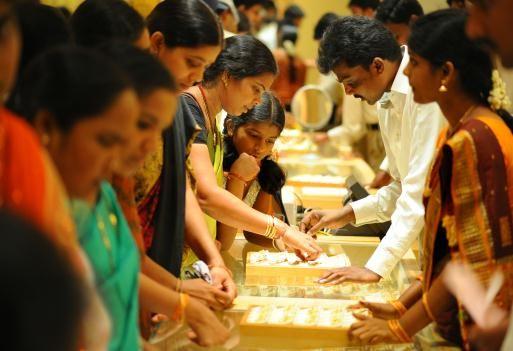
Mumbai, May 12: The continued weakness in gold prices is likely to boost jewellery sales by up to 40 per cent this Akshay Tritiya, according to retailers.
"Due to the sudden dip in prices, we expect a very positive response from consumers as now is the time they indulge in gold. The festive season along with the low rates make it a perfect spending opportunity. The increase expected can be anywhere around 30-40 per cent compared to last year," Manubhai Jewellers Director Samir Sagar told PTI here.
Echoing him, Shree GaneshJewellery House Head-Retail, GAJA, Rahul Singh said, "We expect around 40 per cent rise in Akshay Tritiya sales compared to last year."
The day is considered auspicious to buy gold. But non-Hindu buyers also take advantage of the offers and discounts offered by jewellers, he added.
All India Gems and Jewellery Federation (GJF) Chairman Haresh Soni said overall sales in jewellery and bullion is expected to rise by about 25 per cent considering current reduction in gold prices this Akshay Tritiya.
From the regional perspective, southern India is expected to consume high percentage of sales, he added.
Gitanjali Group Chairman and Managing Director Mehul Choksi said drop in gold prices normally boosts demand for jewellery and coins. When the gold peaked late last year at above Rs 32,000 per 10 grams, demand slowed in terms of value, while during the recent drop to almost Rs 27,000 there has been a surge of consumers in jewellery stores across India. "If gold prices remain relatively weaker than last year's peak, which is what the market now expects, then demand will be good, if they fall further, demand on Akshay Tritiya will soar by 30 per cent," he added.
Kotak Mahindra Bank Executive Vice President Puneet Kapoor said this season Kotak Mahindra Bank is expecting to sell around 175 kg of gold coins and bars, which will be 30 per cent higher compared 135 kg during last Akshay Tritiya.
After witnessing steep fall in prices -- up to almost 20 per cent -- the price of gold became stagnant at the new level, and has again started inching upwards in anticipation of higher demand.
In the last 10 days, gold has already gained almost 8 per cent and if the trend continues, it will bring investor community back to the fore, he pointed out.
Reliance Capital Executive Director, Broking and Distribution Business, Vikrant Gugnani said gold prices as well as gold sales hit a high during last Akshay Tritiya. "The run-up to this Akshay Tritiya has seen some volatility in the gold prices and we expect this to have a positive impact on sales of gold coins. We are optimistic and expect a 30 per cent growth in sales over last year," he said. The bearish trend in gold prices has also given boost to online jewellery sales as the e-commerce has matured in jewellery segment in the past 10-12 months.
JewelsNext.com CEO Gaurav S Issar said, "We are expecting good sales with ticket size of Rs 25,000-50,000 this season. Last Diwali, transactions ranged between Rs 10,000-20,000 since there was no marketplace model, less awareness about e-commerce, less matured market."
On the investment side, Religare Securities AVP & in-charge - Metals, Energy and Currency Research - Sugandha Sachdeva said a steep correction in prices just ahead of Akshay Tritiya is absolutely a perfect time for the investors for fresh buying.
The ETF data of previous years suggests that the turnover on Akshay Tritiya has been extraordinarily high. "Gold Exchange Traded Funds (ETF) on NSE recorded a turnover of around Rs 600 crore last year on Akshay Tritiya and this year we expect an additional growth of around 400 crore, given the fact that gold appears to be a good bargain at current levels.
Last year, India's gold consumption (coins and jewellery) on this day was around 17 tonnes and this year sales are expected to be around 20 to 25 tonnes, if prices drop further," she added. MCX gold this week-end was at Rs 26,987 per 10 grams, while in the international market it was at USD 1,447 an ounce.





Comments
Add new comment